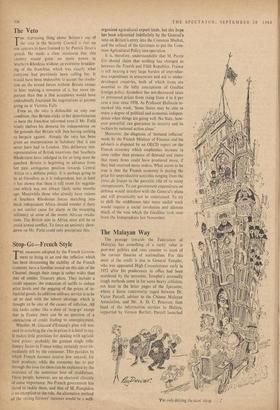Stop-Go—French Style
HE measures adopted by the French Govern- ' ment to bring to an end the inflation which has been threatening the stability of the French economy have a familiar sound on this side of the Channel, though their range is rather wider than that of similar Treasury plans. They include a credit squeeze, the reduction of tariffs to reduce price levels and the pegging of the prices of in- dustrial goods. In addition military service is to be cut to deal with the labour shortage which is thought to be one of the causes of inflation. All this looks rather like a dose of `stop-go' except that in France there can be no question of a contraction of credit leading to unemployment.
Whether M. Giscard d'Estaing's plan will suc- ceed in scotching the rise in prices it is hard to say. It makes little provision for dealing with agricul- tural prices— probably the greatest single infla- tionary factor in France today, certainly most im- mediately felt by the consumer. This paradox by which French farmers receive low rewards for their products, while the consumer has to pay through the nose for them can be explained by the existence of the notorious host of middlemen. These people, however, are an electoral clientele of some importance. No French government has dared to tackle them, and that of M. Pompidou is no exception to the rule. An alternative method of the raising farmers' incomes would be a well- organised agricultural export trade, but this hope has been adjourned indefinitely by the General's veto on Britain's entry into the Common Market, and the refusal of the Germans to put the Com- mon Agricultural Policy into operation.
It is, therefore, understandable that M. Pierre Uri should claim that nothing has changed as between the Fourth and Fifth Republics. France k still bearing a very large burden of unproduc- tive expenditure in armaments and aid to under- developed countries, both of which items are essential to the lofty conceptions of Gaullist foreign policy. Grandeur has not decreased taxes or prevented prices from rising from 4 to 6 per cent a year since 1958. As Professor Hallstein re- marked this week, 'Some States may be able to enjoy a degree of political and economic indepen- dence when things are going well. No State, how- ever powerful, can guarantee its security and its welfare by national action alone.'
Moreover, the diagnosis of 'demand inflation' made by the French Minister of Finance and his advisers is disputed by an OECD report on the French economy which emphasises increase in costs rather than pressure of demand and states that many firms could have produced more, if they had received more orders. What seems to be true is that the French economy is paying the price for unproductive activities ranging from the force de frappe to the parasitic role of so many entrepreneurs. To cut government expenditure on defence would interfere with the General's plans and will presumably not be entertained. To try to shift the middlemen into more useful work would require a social revolution and alienate 'finial of the vote which the Gaullists took over from the Independents last November.






































 Previous page
Previous page